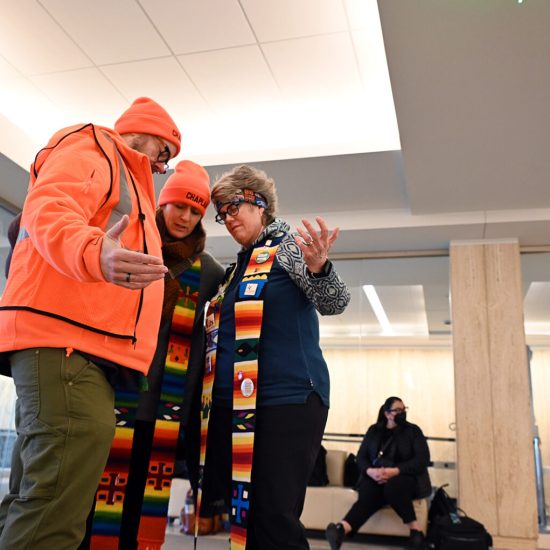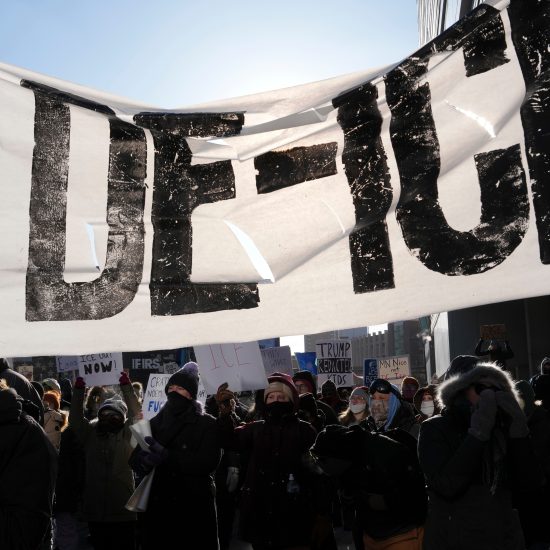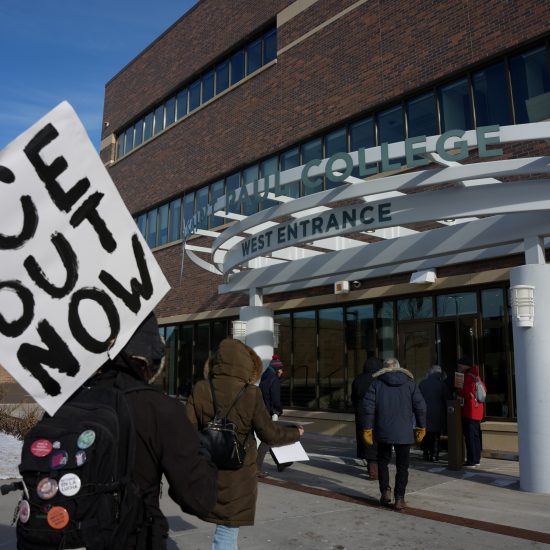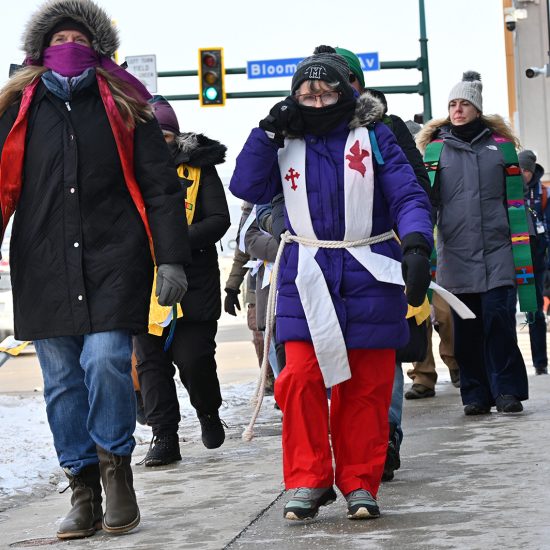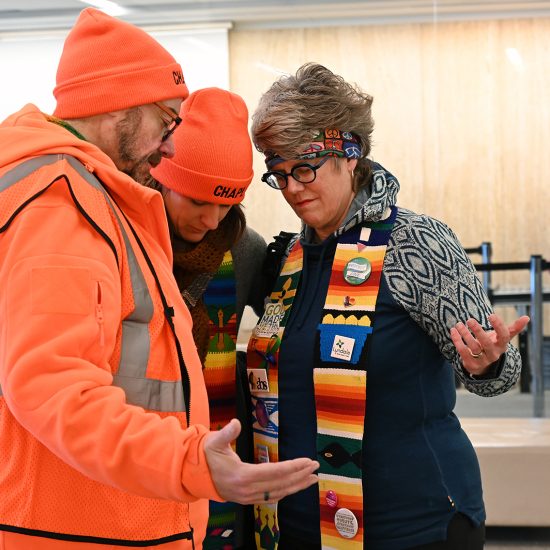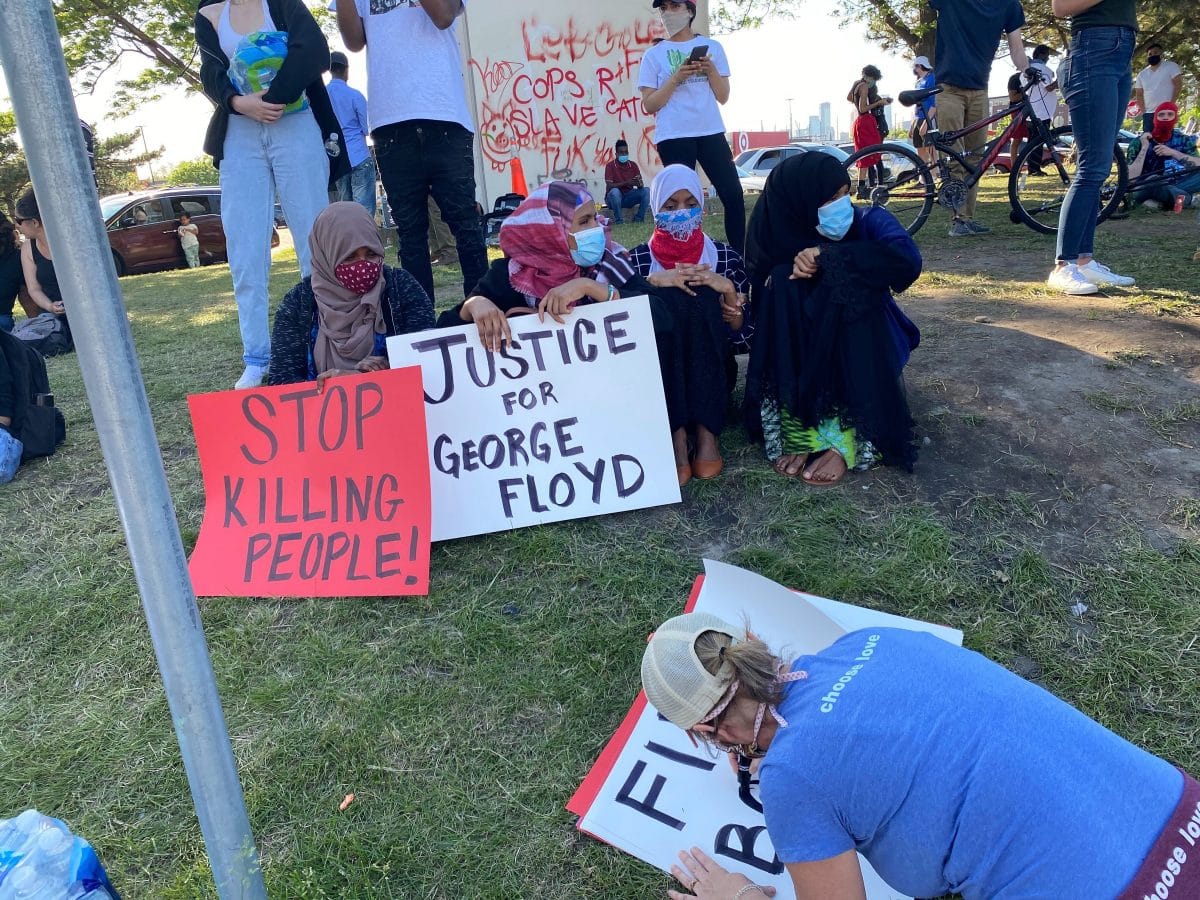
(RNS) — Faith leaders in Minneapolis, Minnesota, are offering aid to demonstrators who have taken to the streets to decry racism and police brutality, working to balance religious calls for justice with an aversion to violence and a desire to prevent the spread of infection during the ongoing novel coronavirus pandemic.
The city has been rocked by unrest this week following the death of George Floyd on Monday (May 25). His final moments were recorded in a widely shared video: Floyd, a black man, is seen writhing underneath Derek Chauvin, a white police officer, begging the official to remove his knee from his neck while gasping, “I can’t breathe.”
Three other officers are seen standing nearby keeping the crowd at bay until Floyd eventually falls silent. The video sparked demonstrations decrying racism and police brutality, drawing out faith leaders hoping to muster a religious response.
Billy G. Russell, the pastor of Greater Friendship Missionary Baptist Church, a predominately African American congregation situated roughly a mile from where Floyd died, has attended several protests in an effort to offer a ministerial presence and “keep the peace.” His message was amplified on Thursday when Jesse Jackson spoke at Missionary Baptist.
Russell said the famed civil rights activist called for “protest and peace” while addressing nearly 100 people and community leaders — all of whom were spread apart to maintain social distancing amid the novel coronavirus pandemic. Jackson urged the crowd to continue demonstrating until the officers involved are charged with murder, adding: “don’t do it in a way that hurts you.”
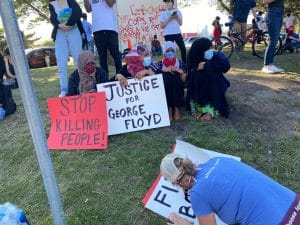
People make and display signs while protesting the death of George Floyd in Minneapolis, Minnesota, on May 28. (Doug Pagitt/Religion News Service)
But when city officials held a press conference that same day and did not announce charges against the officers, the resulting fury among demonstrators left Russell turning to God.
“We pray, and again I say: if God can’t do it, it can’t be done,” he said.
Chauvin was arrested Friday (May 29) by investigators and charged with murder, but protests persist. So do religious efforts to help demonstrators.
Holy Trinity Lutheran Church in Minneapolis has opened its doors to offer sanctuary to demonstrators and provide medics use of their space as a makeshift emergency clinic. Positioned around the corner from the Third Precinct police station — the epicenter of many demonstrations — Holy Trinity lead pastor Ingrid Arneson Rasmussen said the congregation was eager to offer some form of assistance to the wounded.
“We have our front doors wide open,” Rasmussen said. “We have an intake area out on the front lawn, and then immediately inside those doors is the sanctuary and the community room. People have been resting on the pews in the sanctuary.”
The protest clinic previously operated out of a facility run by Interfaith Power and Light, a religious environmental group, but had to suspend operations after a nearby building was set ablaze. When IPL officials asked Holy Trinity to pick up where they left off, the church had the clinic up and running out of their sanctuary within an hour.
Medics are now living and working out of the church, featuring a mixture of outsiders who have come into the city to assist, local residents from the neighborhood, and members of the congregation. Some volunteers are now offering trauma-informed counseling to demonstrators.
Holy Trinity — which is led by Rasmussen, who is white, and associate pastor Angela T. Khabeb, who is black — reacted rapidly because the congregation has spent the past few years focusing on issues of race, said Rasmussen.
“We, as a church body, believe that all lives are sacred and that black lives have been denied their sacred life — not in the eyes of God, but in the eyes of a society that has been built on social, economic, and racial inequities,” she said.
Rasmussen said the effort to open up the church was led by a family of congregants that included a woman who participated in similar work during the 2014 demonstrations in Ferguson, Missouri. When protests broke out there after the killing of Michael Brown, a young African American man, by a white police officer, some churches also offered themselves as “sanctuaries” for demonstrators.
Rasmussen is one of several faith leaders from across the religious spectrum who have signed a letter calling on the city government to arrest the officer “who killed George Floyd and those (officers) who stood by and passively watched a murder.”
“We urge you to immediately charge and arrest (Officer Derek) Chauvin and his accomplices, and declare unequivocally that the murder of Black people by police is despicable and utterly unacceptable,” reads the letter. “There cannot be peace until there is justice.”
Jaylani Hussein, executive director of the Minnesota chapter of the Council on American-Islamic Relations, said his group teamed up with other civil rights organizations to host a rally and march in downtown Minnesota on Thursday. Hussein gave a speech to the thousands of demonstrators who attended the peaceful protest, urging authorities to arrest the officers involved and assign a special prosecutor to the case.
“We didn’t just lose George Floyd, we lost his grandchildren, his great-grandchildren — we lost his descendants,” he told RNS. “When you lose a life like this, you lose humanity, and when you save a life, you are saving humanity. This is the teaching of Islam.”
Carin Mrotz, executive director of Jewish Community Action, said Hussein’s argument echoes her own group’s reasoning for participating in demonstrations.
“Mishnah tells us that when you take a life, you destroy humanity, and what we saw as a community on Monday night was a murder,” Mrotz said. “It is the destruction of humanity, and we are absolutely compelled to fight for humanity.”
JCA plans to resume organizing this weekend after the conclusion of the Jewish festival of Shavuot. They hope to convene a call centering the voices of black Jews as well as organize a food drive for people destabilized by the unrest.
“There are folks who are, as of today, living in a food desert,” she said.
Doug Pagitt, founder of the church Solomon’s Porch in Minneapolis and head of the liberal religious advocacy group Vote Common Good, said he was organizing a group of clergy to stand near the demonstrations Thursday evening to help deescalate tensions between police and protesters.
“There’s a kind of thing that we know happens: police and other agitators will act differently with religious leaders around,” he said, adding that he was concerned about outside actors attempting to influence the protests.
Pagitt’s call for clergy participants singled out white clergy in particular, urging them to make use of “whatever level of social privilege” they have. The pastor and activist said he was inspired by the biblical passage from Jeremiah 6:14, which reads, “They have treated the wound of my people carelessly, saying, ‘Peace, peace,’ when there is no peace.”
“When there is no peace and you’re telling people to feign peace, you take it in vain — you mock it,” he said. “As someone who is a faith leader who is called to collective cultural peace, what we can’t allow is for people to use a faux version of it.”
The frenetic demonstrations are further complicated by the ongoing novel coronavirus pandemic, which has killed more than 100,000 people in the United States. Nearly 1,000 of those deaths occurred in Minnesota, where recorded cases of the virus are currently increasing, according to The New York Times.
Rasmussen said workers at Holy Trinity are striving to maintain social distancing and are providing masks to those who need them. But there are limits: when protesters arrive requesting treatment for injuries, physical touch is required. Paggit said he remains “extremely concerned” about the pandemic. He requested that all participants in the clergy demonstration wear masks and observe social distancing whenever possible.
Russell is urging people to wear masks as well, and his church is stepping up efforts to provide resources to those currently unable to travel to grocery stores and pharmacies — either because of the pandemic or because of the unrest. And when it comes to the protests, the pastor says he will continue to insist on peace even as he identifies with the fury exhibited by demonstrators.
“We tried to be out last night to stop the violence, but we just kind of got pushed aside,” he said.

